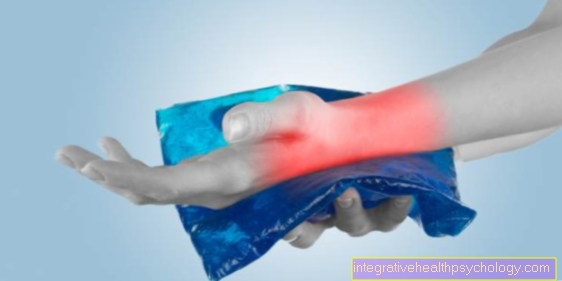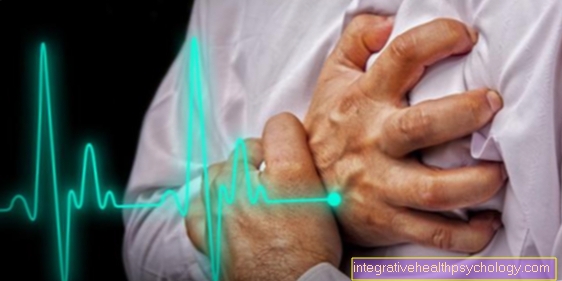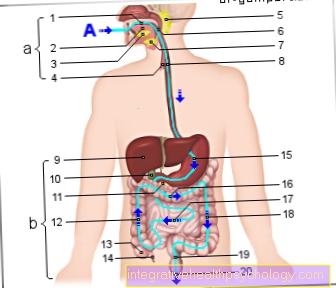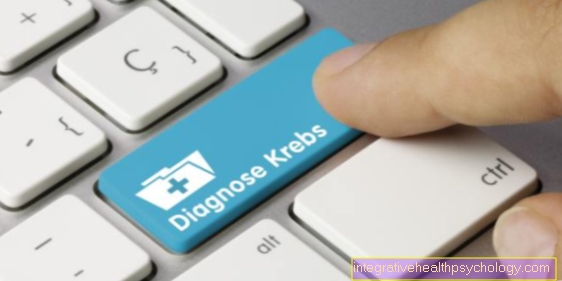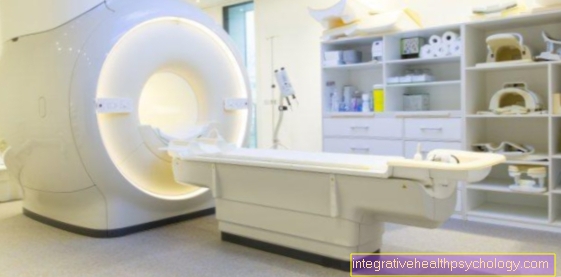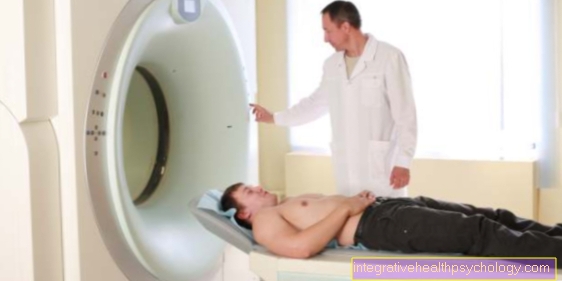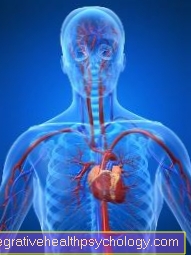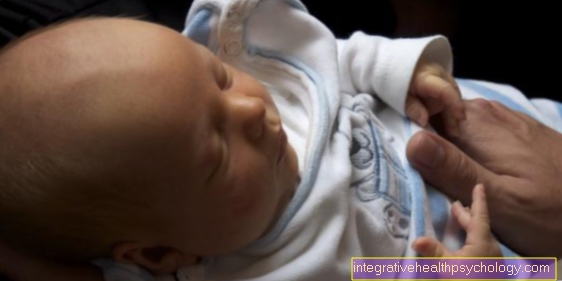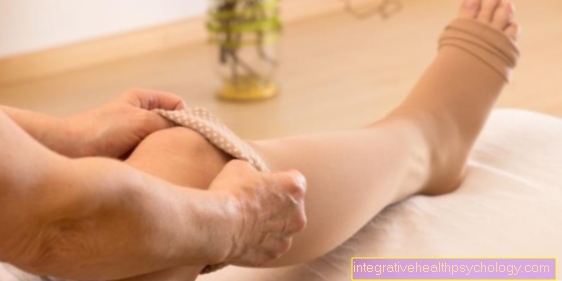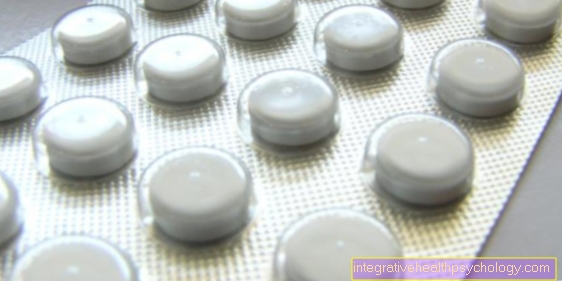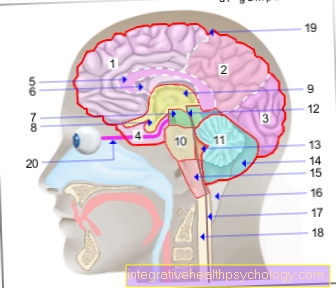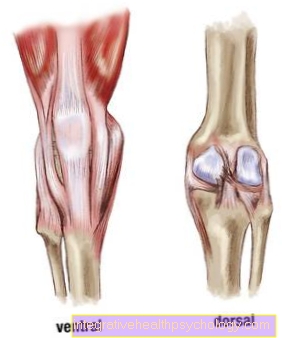Causes of Kidney Pain
What causes lead to kidney pain?

The causes for Kidney pain are diverse and affect the kidney itself or the urinary tract. The following diseases can cause kidney pain:
- Pelvic inflammation (Pyelonephritis)
- Kidney stones (Nephrolithiasis) or Ureteral stones (Ureterolithiasis)
- Kidney trauma
- Kidney cancer (Kidney cancer)
- Constrictions with subsequent urinary obstruction (Stenosis)
- Urinary reflux (vesicoureteral Reflux)
- Kidney infarction
A simple cold can rarely be the cause of kidney pain.
Kidney inflammation - a possible cause of kidney pain
An acute inflammation of the renal pelvis accompanied by kidney pain is usually triggered by bacterial pathogens. The renal pelvis is often inflamed as a result of a urinary tract infection, as the germs rise up the urinary tract towards the kidneys and trigger the inflammation there (Germ ascension).
Read more on this topic: Kidney pain after a bladder infection
Kidney stones - a possible cause of kidney pain
Depending on the composition of the stones, there are different causes for stone formation. There are stones containing calcium, urate, magnesium and carbon which crystallize out when the solubility of their constituents is exceeded.
Do the stones causing kidney pain contain calcium (Calcium phosphate, calcium oxalate stones), an excess of calcium in the blood causes stone formation (Hypercalcemia).
Are you interested in this topic? Read more about this in our next article: Calcified Kidney - Causes, Diagnosis & Therapy
Too much uric acid in the blood (Hyperuricemia) favors the formation of urate stones; If the urinary tract is infected, stones containing magnesium, calcium or carbon can form. The formatting of concretions is also favored in the case of flow obstacles in the urinary tract, since the urinary stagnation promotes their crystallization. Furthermore, there are congenital (for example enzyme deficiency) and iatrogenic (by the doctor, for example certain medication) factors that are associated with increased stone formation and thus also kidney pain.
In general, the risk of calculus formation is increased by age, male gender, too little drinking, poor metabolism and a certain climate.
Read more on the topic: This is the best way to prevent kidney stones!
Urinary reflux - a possible cause of kidney pain
Urinary reflux (Reflux) means that the urine travels the opposite way from the bladder to the ureter (Ureter) Direction kidney takes. The cause for this are either a congenital malformation of the connection between ureter and bladder ("Leakage" of the orifice) or acquired reasons such as urinary tract infection, a disorder affecting the innervation of the bladder (neurogenic disorder) or a bladder emptying disorder. Furthermore, such reflux can result from injuries to the ureter orifice according to medical examinations (iatrogenic). Regardless of the cause of the reflux, an affected person complains Kidney painif germs enter the kidneys via the returning urine (Germ ascension) and cause inflammation including kidney pain there.
Other less common causes of kidney pain
Kidney trauma as the cause:
Kidney trauma can result from any injury to the abdomen, for example from blows, falls, knife wounds or traffic accidents. The kidney pain is caused by the involvement of the kidneys.
Kidney cancer as the cause:
Kidney cancer is most sporadic, but inherited forms also exist. Also solvents (Trichlorethylene) can cause kidney cancer. Risk factors for cancer development include obesity, nicotine and poor diet (high-fat) represent.
Stenosis as the cause:
A narrowing and thus an obstacle to drainage can occur at any point in the urinary tract. Congenital changes (including ureteral valves), stones, cancer or neurological diseases can be the cause. The obstructed urine outflow causes it to back up, which increases the risk of infection in the kidneys and / or creates a so-called urinary stasis kidney. This also leads to an enlarged kidney. If the kidneys are affected, kidney pain develops.
Kidney infarction as the cause:
A kidney infarction is a vascular blockage of the kidney vessels caused by a blood clot (thrombosis, embolism) on the basis of vascular changes (for example arteriosclerosis). As a result of the occlusion, the blood flow to the kidney tissue is interrupted and dies (necrosis).
Other causes:
A distinction must be made between kidney pain and pain sensations that are also felt in the flank (flank pain), but do not affect the kidneys. These include muscular pain, sensations of pain in the spine (for example, a slipped disc of the thoracic spine), shingles (herpes zoster) and diseases of other organs of the abdomen or gynecological diseases. While these sensations are projected into the kidney area, it is not actually kidney pain per se, as the kidneys are not the structures that cause the pain.
Can Stress Be a Cause of Kidney Pain?
Kidney pain can have numerous causes. Stress is actually not one of them. However, pain in the kidney area is not uncommon not from the kidney itself but for example from the back or from the muscles out. Back pain or pain in the frame muscular tension can very well be caused by stress.
Can I experience kidney pain after consuming alcohol?
There are people who report having kidney pain after consuming alcohol. There is (at least so far) no scientific explanation for this. It is unlikely that the pain is actually from the kidney. Muscular pain or pain that originates from the spine, for example, is more likely. But here, too, there has so far been no reliable connection between alcohol consumption and muscle or back pain.
Read about this: Kidney pain after alcohol




